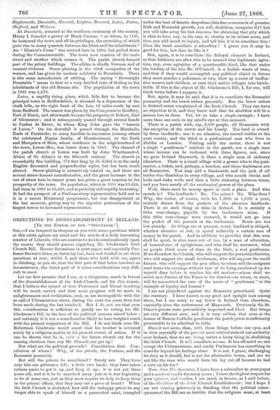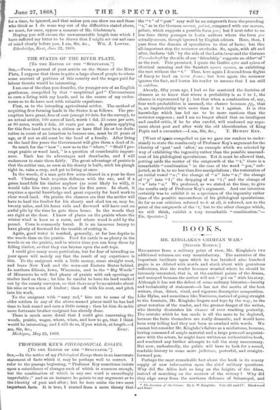OBJECTIONS TO DISESTABLISHMENT IN IRELAND. [To THE EDITOR OF THE
"SPECTATOR."]
am tempted to trespass on you with some questions which at this crisis agitate my mind and the minds of a daily increasing number of Liberals, who are anxious to decide conscientiously upon the course they should pursue regarding Ilr. Gladstone's Irish Church Bill. Recent discussions in your paper, and especially Pro- fessor Brewer's letter on Saturday last, have not tended to set these questions at rest ; whilst I, and those who hold with me, agree in thinking, as you do, that the first part of that letter involves an inconsistency, the latter part of it raises considerations very diffi- cult to meet.
Let me first premise that I am, as a clergyman, much in favour of the disestablishment of the Irish Church, and for this reason, that I believe the spread of true Protestant and liberal teaching will be much served, and that more progress will be made in enlightenment and civilization, such as are incompatible with the to-called Ultramontane views, during the next ten years than has been made daring the last hundred. But I do not see that even this consideration is sufficient to justify me in voting for Mr. Gladstone's Bill, in the face of the political reasons stated below ; and certainly it is not a consideration likely to have weighed much with the present supporters of the Bill. I do not think even Mr. Robertson Gladstone would assert that his brother is actuated solely by a religious motive in his present course of action. If it can be shown that he is, voila a far better church cry for the coming elections than any Mr. Disraeli can get up !
But what are the political grounds? Conciliation, first. Con- ciliation of whom? Why, of the priests, the Fenians, and the Romanist peasantry.
But will the priests be conciliated ? Surely not. They have only this one grievance left ; a little ewe lamb ; they have taken infinite pains to get it up, and keep it up ; it is not yet three years old, and is it to be snatched away just as it was beginning to be of some use, just as they most require its help to keep them in the priests' offices, that they may eat a piece of bread ? When the Irish Church is abolished, how will the unhappy priest be any longer able to speak of himself as a persecuted saint, trampled under the heel of heretic despotism (this fine sentence is of genuine Irish and Romanist growth, you will, doubtless, recognize it)? but you will take away his last resource for obtaining that pity which is akin to love, nay, in his case, to charity in its widest sense, and then you add insult to injury, and tell him it is to conciliate him ! Does the birch conciliate a schoolboy? I grant you it may be good for him, but does he like it ?
But, again, it is to conciliate the disloyal element in Ireland, so that Irishmen are after this to be assured that legitimate agita- tion, nay, even agitation of a questionable kind, like that under the leading of the late Mr. O'Connell, is a foolish waste of time, and that if they would accomplish any political object in future they must murder a policeman or two, blow up a score of inoffen- sive women and children, or tarn their native villages into battle- fields. If this is the object of Mr. Gladstone's Bill, I, for one, will think twice before I support it.
But, again, it may be said that it is to conciliate the Romanist peasantry and the lower orders generally. But the lower orders in Ireland never complained of the Irish Church. They can have no objection to it, and they know well that its abolition will be a serious loss to them. For, let us take a single example ; I have more than one such in my mind's eye at this moment.
There is a parish with, say, 2,000 people, all Romaniats with the exception of the rector and his family. The land is owned by three landlords ; one is an absentee, the second resides in the next county, and the third is a professional man who lives in Dublin or London. Patting aside the rector, there is not a single " gentleman " resident in the parish, nor a single man whose income can be reckoned with three figures, nor, since we gave Ireland Maynooth, is there a single man of ordinary education. There is a small village with a grocer who is the post- master, a baker, and, perhaps, a butcher, and these tradesmen are all Romanists. You may add a blacksmith and the jack of all trades who flourishes in every village, and who mends clocks and locks and sinks wells and does a little tinkering between times, and you have nearly all the mechanical power of the place.
Well, there must be money spent in such a place. And who spends it ? The landlords ? No. The priest ? No. Who then ?
Why, the rector, of course, with his 1,2001. or 1,3001. a year, entirely drawn from the pockets of the absentee landlords. There is no such thing as tithe in Ireland. It is entirely a tithe rent-charge, payable by the landowners alone. If this tithe rent-charge were restored, it would not go into the pocket of the peasant or the tradesman. Rents are too low already. As things are at present, every landlord is obliged, whether absentee or not, to spend indirectly a certain sum of money in his parish. And in addition he provides that this sum shall be spent, in nine cases out of ten, by a man of education, of benevolence, of uprightness, and who shall be, moreover, what no people think more of than do the Irish, a real gentleman.
if we disendow the Church, who will support the parochial charities, who will support the small tradesman, who will support the small farmer, who will support the post office, to whom will the emigrant send home his earnings without fear of its being swallowed up for unpaid dues before it reaches his old mother—whom shall we select as a Justice of the Peace in the district—to whom, in short, will be committed the care of the name of " gentleman " or the example of loyalty and honour ?
I am not prejudiced against the Romanist priesthood. Quite the contrary. I have known many good and upright men among them, but I am sorry to say fewer in Ireland than elsewhere, especially since the endowment of Maynooth. Previously the St. Omer's priests were proverbially respected and liked. But things are very different now, and it is very seldom that even at the houses of Roman Catholic gentlemen the parish priest is sufficiently presentable to be admitted to table.
Does it not seem, then, with these things before our eyes, and in view especially of the present most critical state of our authority over Ireland, that we are doing rather a hasty thing in abolishing the Irish Church. It will conciliate no one. It has offended no one except the Ultramontane, and surely Parliament has something to consider beyond his feelings alone. It is not, I grant, discharging its duty as it should, but is not the alternative worse, and are we not like the man who would have his leg cut off because he had a corn on his toe ?
Now, dear Mr. Spectator, I have been a subscriber to your paper and a constant reader for many years ; I have the highest respect for your opinion, and besides, I am much in favour, as I said before, of the abolition of the Irish Church Establishment ; but I hope I am not sinning grievously in thinking that the political conse- quences of the Bill are so terrible that the religious must, at least
for a time, be ignored, and that unless you can show me and those who think as I do some way out of the difficulties stated above, we must, for once, oppose a measure of Mr. Gladstone's.
Hoping you will excuse the unwarrantable length into which I have suffered my letter to be drawn that I might set our sad case of mind clearly before you, I am, Sir, &c., Was. J. LOFTIE. Edenbridge, Kent, June 22, 1868.































 Previous page
Previous page